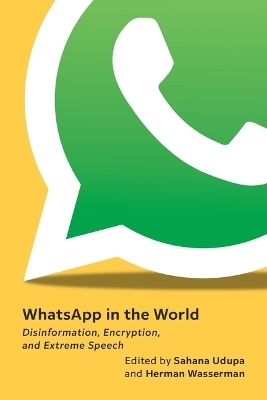
WhatsApp in the World
Disinformation, Encryption, and Extreme Speech
Seiten
2025
New York University Press (Verlag)
978-1-4798-3327-6 (ISBN)
New York University Press (Verlag)
978-1-4798-3327-6 (ISBN)
- Noch nicht erschienen (ca. Juli 2025)
- Versandkostenfrei innerhalb Deutschlands
- Auch auf Rechnung
- Verfügbarkeit in der Filiale vor Ort prüfen
- Artikel merken
A groundbreaking global analysis of the vastly popular instant messaging service
Known by the popular nickname “ZapZap” in Brazil and synonymous with the Internet across Africa and South Asia, WhatsApp has emerged as a major means of communication for millions of people around the world. Unlike social media platforms such as Twitter and Facebook, WhatsApp offers a closed, encrypted communication architecture that ostensibly limits the reach and exposure of shared content.
While recent scholarship has drawn attention to the risks it poses to democratic systems and marginalized communities, WhatsApp in the World is the first study to offer a systematic global view of an encrypted instant messaging service. Rather than taking the technical feature of “encryption” at face value, the volume proposes the conceptual framework of “lived encryptions” to highlight the different, often contradictory, formations around encrypted messaging, as evidenced in the way the promised confidentiality of encrypted messaging is upturned completely when surveilling states seize the phones from suspected dissenters to download the data, or how seemingly closed group communication is channelized to “broadcast” top-down political messages.
WhatsApp in the World features field-based and multidisciplinary research, including contributions from practitioners at leading fact-checking institutions on how encrypted instant messaging services play a critical role in shaping extreme speech and disinformation ecosystems in different regions of the world. From election manipulations in South Africa and Nigeria to Russian diaspora activism in Europe to WhatsApp use as an everyday infrastructure in Brazilian favelas and among nationalists in India, this volume demonstrates how many core features of WhatsApp—from disappearing messages and quick forwards to group chats and calls—allow for the amplification of disinformation and extreme speech. Highlighting complex political dynamics on the ground, it also introduces the significant methodological challenges of studying encrypted messaging services, providing critical pathways to address issues around ethical and technical issues of data protection, privacy, and confidentiality.
Known by the popular nickname “ZapZap” in Brazil and synonymous with the Internet across Africa and South Asia, WhatsApp has emerged as a major means of communication for millions of people around the world. Unlike social media platforms such as Twitter and Facebook, WhatsApp offers a closed, encrypted communication architecture that ostensibly limits the reach and exposure of shared content.
While recent scholarship has drawn attention to the risks it poses to democratic systems and marginalized communities, WhatsApp in the World is the first study to offer a systematic global view of an encrypted instant messaging service. Rather than taking the technical feature of “encryption” at face value, the volume proposes the conceptual framework of “lived encryptions” to highlight the different, often contradictory, formations around encrypted messaging, as evidenced in the way the promised confidentiality of encrypted messaging is upturned completely when surveilling states seize the phones from suspected dissenters to download the data, or how seemingly closed group communication is channelized to “broadcast” top-down political messages.
WhatsApp in the World features field-based and multidisciplinary research, including contributions from practitioners at leading fact-checking institutions on how encrypted instant messaging services play a critical role in shaping extreme speech and disinformation ecosystems in different regions of the world. From election manipulations in South Africa and Nigeria to Russian diaspora activism in Europe to WhatsApp use as an everyday infrastructure in Brazilian favelas and among nationalists in India, this volume demonstrates how many core features of WhatsApp—from disappearing messages and quick forwards to group chats and calls—allow for the amplification of disinformation and extreme speech. Highlighting complex political dynamics on the ground, it also introduces the significant methodological challenges of studying encrypted messaging services, providing critical pathways to address issues around ethical and technical issues of data protection, privacy, and confidentiality.
Sahana Udupa (Editor) Sahana Udupa is Professor of Media Anthropology at the University of Munich (LMU) and author of Making News in Global India: Media, Publics, Politics and co-author of Digital Unsettling: Decoloniality and Dispossession in the Age of Social Media. She is also coeditor of Digital Hate: The Global Conjuncture of Extreme Speech and Media as Politics in South Asia. Herman Wasserman (Editor) Herman Wasserman is Professor of Journalism at Stellenbosch University. He is the author of Tabloid Journalism in South Africa; Media, Geopolitics, and Power: A View from the Global South; and The Ethics of Engagement: Media, Conflict and Democracy in Africa. He is also coeditor of Disinformation in the Global South.
| Erscheint lt. Verlag | 8.7.2025 |
|---|---|
| Zusatzinfo | 32 b/w images |
| Verlagsort | New York |
| Sprache | englisch |
| Maße | 152 x 229 mm |
| Themenwelt | Sozialwissenschaften ► Kommunikation / Medien ► Journalistik |
| Sozialwissenschaften ► Kommunikation / Medien ► Medienwissenschaft | |
| Technik ► Nachrichtentechnik | |
| Wirtschaft | |
| ISBN-10 | 1-4798-3327-4 / 1479833274 |
| ISBN-13 | 978-1-4798-3327-6 / 9781479833276 |
| Zustand | Neuware |
| Informationen gemäß Produktsicherheitsverordnung (GPSR) | |
| Haben Sie eine Frage zum Produkt? |
Mehr entdecken
aus dem Bereich
aus dem Bereich


